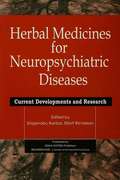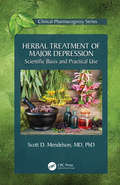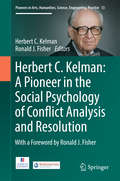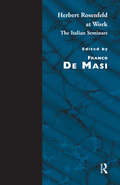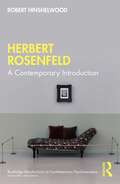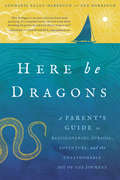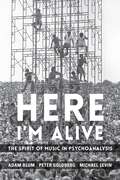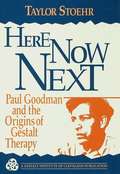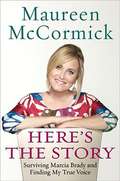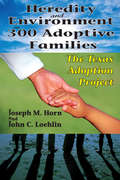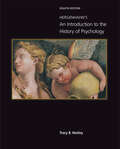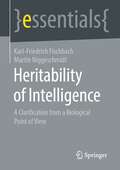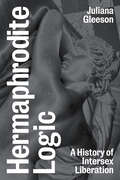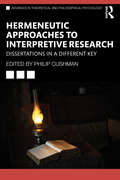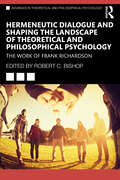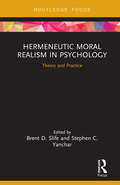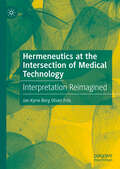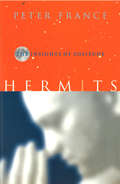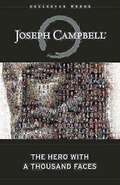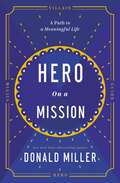- Table View
- List View
Herbal Medicines for Neuropsychiatric Diseases: Current Developments and Research
by Shigenobu Kanba Elliott RichelsonPublished in 1999, Herbal Medicines for Neuropsychiatric Diseases is a valuable contribution to the field of Psychiatry/Clinical Psychology.
Herbal Treatment of Major Depression: Scientific Basis and Practical Use (Clinical Pharmacognosy Series)
by Scott D MendelsonThis unique volume presents new understandings of the neurochemical nature of major depression, and how herbs and their constituent flavonoids and terpenes appear to address some of the mechanisms now thought to be involved. It explores how recent studies of the rapid antidepressant effects of ketamine inform neuroscientists about deep intracellular mechanisms of antidepressant action that have little to do with simple enhancement of monoaminergic activity. These mechanisms include actions on PI3K, Akt, mTOR, GSK3, BDNF, and other intracellular pathways. New theories of the pathophysiology underlying major depression, such as oxidative damage, inflammation, stress and insulin resistance are then explored.Key Features: Focuses on oxidative damage, inflammation, and metabolic syndrome. Explains that a significant percentage of people treated for major depression obtain little if any relief from standard antidepressant medications. These facts lead to discussion of herbs that can be used to treat major depression, as well as consideration of the scientific basis for how these herbs act. The antidepressant properties of 66 herbs are discussed, along with dosing and safety information.
Herbert C. Kelman: A Pioneer in the Social Psychology of Conflict Analysis and Resolution
by Herbert C. Kelman Ronald J. FisherThis edited volume presents selected papers capturing Herbert Kelman's unique and seminal contributions to the social psychology of conflict analysis and resolution, with a special emphasis on the utility of concepts for understanding and constructively addressing violent and intractable conflicts. Central concepts covered include perceptual processes, basic human needs, group and normative processes, social identity, and intergroup trust, which form the basis for developing interactive methods of conflict resolution.
Herbert Rosenfeld at Work: The Italian Seminars
by Herbert A. RosenfeldBetween 1978 and 1985 Dr Herbert Rosenfeld was one of a number of British analysts invited by a group of Societa di Psicoanalisi Italiani members to conduct a series of seminars and supervisions for the purpose of deepening and refining that group's clinical skills and theoretical understanding. This book is an illuminating record of that encounter, and a warm tribute to the significant influence of Rosenfeld's contribution.It is divided into two parts - 'Theoretical' and 'Clinical', and based on a selection of verbatim transcripts recorded at the time. These transcripts, with their dialogical form, succeed in capturing much of the specificity of oral exchange, and thus convey a strong impression of Rosenfeld the man as much as clinician or theoretician. Rosenfeld remained to the end a continuously creative analyst and these 'last thoughts' provide the reader with ample evidence of his undimmed gifts. His subtle intuitions, meticulously close attention to both patient's and analyst's interpretations, and fine appreciation of the intricacies of the analytic encounter, are abundantly present.
Herbert Rosenfeld: A Contemporary Introduction (Routledge Introductions to Contemporary Psychoanalysis)
by Robert HinshelwoodThis bold and insightful book is the first to present the full work of highly influential British analyst, Herbert Rosenfeld. This Contemporary Introduction covers all of Rosenfeld’s significant publications between 1947 and 1987, as well as the later edited version of his clinical seminars in Italy. Hinshelwood deftly shows how Rosenfeld adopted Melanie Klein's theories on schizoid mechanisms and psychotic psychodynamics and applied them to working with patients experiencing psychosis. He traces the use of these ideas in an evolving understanding of psychotic states and other forms of disturbance. This book will be of interest to psychoanalysts and psychotherapists working with the development of Kleinian ideas. It will also be the perfect guide for students, mental health workers and psychotherapists who wish to know more about Rosenfeld’s approach to psychotic states.
Herbs for Cancer Treatment
by Bhupendra KoulThis book provides detailed information on the various types of cancer, etiology, effects, and challenges associated with current cancer treatment regimes. The present edition has been written to reflect recent developments, success rates and lacunae in herbal and modern cancer therapies. It also describes the use of several herbal formulations to boost patients’ immunity, in order to prevent or help them cope with several cancers. The book highlights several herbs/shrubs/trees that have been reported to possess anti-cancer properties, paving the way for in-depth research into the dose standardization and efficacy of plant-based bioactive molecules. It also focuses on the sustainable conservation of medicinal flora, so that, in future, novel biomolecules be extracted and made available for the treatment of various cancers. Given its highly relevant content, the book will benefit the entire cancer research community (students, scientists, pharmacists, herbalists and lecturers) at universities, research institutions and industry in the areas of oncology, herbal cancer therapy, biotechnology, drug discovery, pharmaceuticals, agriculture, and various disciplines of the biomedical sciences.
Herd Behavior in Financial Markets: An Experiment with Financial Market Professionals
by Marco Cipriani Antonio GuarinoA report from the International Monetary Fund.
Here Be Dragons: A Parent’s Guide to Rediscovering Purpose, Adventure, and the Unfathomable Joy of the Journey
by Annmarie Kelly-Harbaugh Ken HarbaughBefore our three kids, we had been decent people. Interesting even. One of us had taught Shakespeare to gang members while the other flew reconnaissance missions off North Korea. But our own children had proven our biggest challenge. We were passionate and service-driven folks, except we were not demonstrating this to our kids. We spent so much time trying to be good parents that we forgot to be good people. Something had to change.Two parents challenge one another to find balance between work and family life. Their stories are both uproarious and poignant as they raise children and strive to leave their mark on the wider world. Filled with tender moments and plenty of laughs, Here Be Dragons recounts the adventures of a family trying to stay afloat, and offers a life raft to the rest of us in choppy waters.
Here Down on Dark Earth: Loss and Remembrance in New York City
by Larry RacioppoDiscover New York’s poignant memorials through powerful photographs capturing everything from fleeting tributes to enduring monumentsThe photographs in Here Down on Dark Earth document the many ways New Yorkers express their intertwined feelings of loss and remembrance. The famous and the unknown, the rich and the poor, meet the same fate, but how they are mourned and remembered varies greatly. New York City’s monuments and memorials are large and small, civic and personal, traditional and vernacular, planned and spontaneous. Some commemorate a significant event such as the terrorist attack on the World Trade Center, others the death of a single child hit by a stray bullet. A memorial of stone and steel dedicated to deceased WWII veterans from a church parish may outlast a painted Rest-In-Peace (RIP) memorial wall for a slain teenager. Still, both grow out of the feeling of loss and a desire to preserve the memory of departed loved ones.As Racioppo traveled throughout New York City, he became increasingly aware of the impermanence of these memorials. The paint eventually peels, and the image gradually disappears. Sanitation workers remove the rotted toys and flowers. Small and personal, or large and communal, created by professionals or amateurs, the memorials in Here Down on Dark Earth express a powerful sense of loss and connection. Throughout the book, the author’s contextual notes accompany the poignant photographs depicting these expressions of remembrance.
Here I'm Alive: The Spirit of Music in Psychoanalysis
by Michael Levin Adam Blum Peter GoldbergHere I’m Alive explores the musical foundation of being human from a psychoanalytic perspective.Writing in collaboration, three psychoanalytic clinicians develop a fresh vision of the essential role of music in psychical life. Through an interdisciplinary exploration, Here I’m Alive shows how music is fundamental to becoming human, establishing our embodied sense of membership and participation in a shared world through the fabric of culture. With one authorial voice, these pages resonate with the musical forms of living that make possible any individual style of conduct or shape of desire and without which we are forever lost in the noise.
Here Now Next: Paul Goodman and the Origins of Gestalt Therapy
by Taylor StoehrPaul Goodman left his mark in a number of fields: he went from being known as a social critic and philosopher of the New Left to poet and literary critic to author of influential works on education (Compulsory Mis-education) and community planning (Communitas). Perhaps his most significant achievement was in his contribution to the founding and theoretical portion of the classic text Gestalt Therapy (with F. S. Perls and R. E. Hefferline, 1951), still regarded as the cornerstone of Gestalt practice. Taylor Stoher's Here Now Next is the first scholarly account of the origins of Gestalt therapy, told from the point of view of its chief theoretician by a man who knew him well. Stoehr describes both Goodman's role in establishing the principal ideas of the Gestalt movement and the ways in which his practice as a therapist changed him, ultimately leading to a new vocation as the "socio-therapist" of the body politic. He places Goodman in the midst of his world, showing how his personal and public life - including his political activities in the 1960s - were transformed by Gestalt ideas, and he presents revealing sketches of other major figures from those days - Fritz Perls, Wilhelm Reich, A. S. Neill, and others.
Here's the Story: Surviving Marcia Brady and Finding My True Voice
by Maureen MccormickAutobiography of the actress who played Marcia Brady on the TV show The Brady Bunch in the 60s and 70s.
Heredity and Child Culture (Routledge Revivals)
by Henry Dwight ChapinFirst published in 1923, this book explores the impact on development that heredity and environment has on children. Chaplin argues that too much reliance is placed on education and in fact parents, physicians and teachers should equally be taking into consideration the physical and mental constitution of the child, which could be linked to hereditary and environmental factors. In conjunction with the moral, spiritual and intellectual predispositions that the child may have, Chaplin argues the pros of eugenics (in the perspective of the early 20th century) and equally the importance of euthenics for future prosperity of generations to come.
Heredity and Environment in 300 Adoptive Families: The Texas Adoption Project
by Joseph HornThis book presents the results of a thirty-five-year research project involving 300 families, each of whom adopted at least one child at birth from a Texas home for unwed mothers during the period of 1962-1970. The book weaves together information about the birth parents of the adopted children; information about the adoptive parents; and information about the children in these families. Children adopted at birth have two sets of parents. Birth parents provide their adopted-away child with a genetic endowment, but do not participate in shaping the child's environment. Adoptive parents do not contribute genetically, but are otherwise in charge of directing the child's development. If adopted children grow up to resemble birth parents they have never seen, the clear inference is that hereditary factors have had an influence. Environmental factors are implicated whenever children resemble their adoptive parents, but not the birth parents. The Texas Adoption Project was designed to investigate the impact of genetic and environmental factors. This unique and innovative longitudinal study is written for specialists and the educated public. An introductory guide is provided for the non-specialist reader explaining the form and statistical content of the tables. Additional technical material for specialists is contained in appendices. This important contribution to the literature on adoption will also be of interest to those interested in the relative weight of genetics and environment in human development.
Hergenhahn’s An Introduction to the History of Psychology
by Tracy B. HenleyDreams puzzled early man, Greek philosophers spun elaborate theories to explain human memory and perception, Descartes postulated that the brain was filled with "animal spirits" and Psychology was officially deemed a "science" in the 19th century. In the new HERGENHAHN'S AN INTRODUCTION TO THE HISTORY OF PSYCHOLOGY, noted author Tracy Henley shows you that most of the concerns of contemporary psychologists are manifestations of themes that have recurred for hundreds--or even thousands--of years. Photographs and learning tools, along with fascinating biographical material on key figures in Psychology, engage you and aid your understanding.
Heritability of Intelligence: A Clarification From a Biological Point of View (essentials)
by Karl-Friedrich Fischbach Martin NiggeschmidtIs intelligence heritable? Karl-Friedrich Fischbach and Martin Niggeschmidt show that "heritability" means something different in biological terminology than in everyday language - which almost inevitably leads to misinterpretations. They explain why twin studies are controversial - and why genetic predictions of IQ and "educational attainment" must be treated with skepticism. This book is a translation of the original German 2nd edition Erblichkeit der Intelligenz by Karl-Friedrich Fischbach & Martin Niggeschmidt, published by Springer Fachmedien Wiesbaden GmbH, part of Springer Nature in 2019. The translation was done with the help of artificial intelligence (machine translation by the service DeepL.com). A subsequent human revision was done primarily in terms of content, so that the book will read stylistically differently from a conventional translation. Springer Nature works continuously to further the development of tools for the production of books and on the related technologies to support the authors.The Authors:Prof. Dr. Karl-Friedrich Fischbach is a developmental biologist and neurogeneticist. He was professor of biophysics and molecular biology at the University of Freiburg from 1985 to 2013, including two years as executive director of the Institute of Biology III. Martin Niggeschmidt is an editor in Hamburg.
Hermaphrodite Logic: A History of Intersex Liberation
by Juliana GleesonHow the intersex liberation movement exposed medical harms and became an inspiration to rethink sex and genderHERMAPHRODITE LOGIC is a bold examination of intersex liberation. Juliana Gleeson reveals how a move-ment challenged systemic medical abuses to reshape our understanding of sex. Blending philosophical insights and personal testimonies, Gleeson argues that intersex people have been harmed not just for therapeutic reasons but to ease professional andparental anxieties.
Hermeneutic Approaches to Interpretive Research: Dissertations In a Different Key
by Philip CushmanThis unique and insightful book brings together a collection of impactful essays written by former psychology doctoral students, which feature hermeneutics as a method of qualitative inquiry. Philip Cushman brings together eleven chapters in which his former students describe their hermeneutic dissertations—how they chose their topics, their approach to research, what they discovered, what it was like emotionally for them, and how the process has influenced them in the years since completion. The contributors explore important contemporary issues like social justice, identity, gender inequality, and the political consequences of psychological theories and offer fresh, critical perspectives rooted in lived experiences. This book showcases the value and importance of hermeneutics, both as a philosophy, and as an orientation for conducting research that aids in critical, culturally respectful, interdisciplinary approaches. This is illuminating reading for graduate students and scholars curious about the hermeneutic approach to research, particularly those engaged in fields like theoretical psychology, clinical psychology, psychotherapy, mental health, cultural history, and social work.
Hermeneutic Dialogue and Shaping the Landscape of Theoretical and Philosophical Psychology: The Work of Frank Richardson
by Robert C. BishopThis volume introduces the methodological value of hermeneutic dialogue in the field of theoretical and philosophical psychology. It reflects on the works of Frank Richardson, who has made, and continues to make, seminal contributions to the field, as well as having influenced the work of many of the practitioners engaged in this field today. Each chapter explores a major topic of hermeneutic dialogue and is authored by a scholar whose work has been directly impacted by Richardson's life and research. The chapters illuminate a variety of issues in psychology, such as instrumentalism, individualism, relationality, social ontology, the wisdom of limits, neoliberalism, and the idea that theory is a form of praxis. All contributions in this volume illustrate aspects of theory as practice coming to expression in reflection on theoretical and philosophical psychology and trace some of the implications for psychology, political philosophy, social justice, community, human dignity, and transcendence. This book will be a valuable resource for students and scholars of theoretical and philosophical psychology, philosophy of the mind, and personality theories.
Hermeneutic Moral Realism in Psychology: Theory and Practice (Advances in Theoretical and Philosophical Psychology)
by Brent D. Slife Stephen YancharTraditional sources of morality—philosophical ethics, religious standards, and cultural values—are being questioned at a time when we most need morality’s direction. Research shows that though moral direction is vital to our identities, happiness, productivity and relationships, there is a decline in its development and use, especially among younger adults. This book argues that hermeneutic moral realism is the best hope for meeting the twenty-first century challenges of scientism, individualism, and postmodernism. In addition to providing a thorough understanding of moral realism, the volume also takes preliminary steps toward its application in important practical settings, including research, psychotherapy, politics, and publishing.
Hermeneutics at the Intersection of Medical Technology: Interpretation Reimagined
by Jan Kyrre FriisThis book explores the crucial role of interpretation in medical radiology and beyond, emphasizing its pervasive influence on medical knowledge. Friis examines radiological analysis through hermeneutics, cognition, and visual perception studies. He argues that interpretation is inherently embodied and essential to human action, particularly in radiology, where technology extends vision beyond the human eye&’s limits. Yet, interpretation varies among radiologists. Can it be too relative, shaped by subjective factors irrelevant to the task? Attempts to eliminate cognitive bias through psychophysical and cognitivist approaches have failed. Interpretation is an active, context-dependent process, inseparable from human experience. Friis contends that the only solution is to expand cognitive reach through collaborative interpretative practices, integrating diverse perspectives. Radiology, like all medical fields, benefits from shared expertise, where multiple viewpoints refine diagnostic accuracy and mitigate individual bias. By fostering structured cooperation among radiologists, clinicians, interpretative reliability can be strengthened. The key is not to eliminate subjectivity but to harness it constructively through interdisciplinary dialogue, collective reasoning, and continuous knowledge exchange.
Hermits: The Insights of Solitude
by Peter FranceOurs is an age where solitude tends to be discussed in the context of the 'problem of loneliness'. However in previous ages the capacity to seek fulfillment outside society has been admired and seen as a measure of discernment and inner security. In this lucid and highly readable book, Peter France shows how hermits, from the Taoists and Ancient Greeks to the present day, have something vitally important to say to a society that fears solitude.
Hero With A Thousand Faces (The\collected Works Of Joseph Campbell Ser.)
by Joseph CampbellSince its release in 1949,The Hero with a Thousand Faces has influenced millions of readers by combining the insights of modern psychology with Joseph Campbell’s revolutionary understanding of comparative mythology. In these pages, Campbell outlines the Hero’s Journey, a universal motif of adventure and transformation that runs through virtually all of the world’s mythic traditions. He also explores the Cosmogonic Cycle, the mythic pattern of world creation and destruction. As part of the Joseph Campbell Foundation’s Collected Works of Joseph Campbell, this third edition features expanded illustrations, a comprehensive bibliography, and more accessible sidebars. As relevant today as when it was first published,The Hero with a Thousand Faces continues to find new audiences in fields ranging from religion and anthropology to literature and film studies. The book has also profoundly influenced creative artists including authors, songwriters, game designers, and filmmakers and continues to inspire all those interested in the inherent human need to tell stories.
Hero of Flight 93: Mark Bingham
by Jon BarrettStory of Mark Bingham's life and re-creation of the events of 9-11.
Hero on a Mission: A Path to a Meaningful Life
by Donald MillerNew York Times bestselling author Donald Miller shares the plan that led him to turn his life around.There are four characters in every story: The victim, the villain, the hero, and the guide. These four characters live inside us. If we play the victim, we&’re doomed to fail. If we play the villain, we will not create genuine bonds. But if we play the hero or guide, our lives will flourish. The hard part is being self-aware enough to know which character we are playing.In this book, Donald will use his own experiences to help you recognize if the character you are currently surfacing is helping you experience a life of meaning. He breaks down the transformational, yet practical, plan that took him from slowly giving up to rapidly gaining a new perspective of his own life&’s beauty and meaning, igniting his motivation, passion, and productivity, so you can do the same.The lessons in this book will teach you how to:Help you discover when you are playing the victim and villain.Create a simple life plan that will bring clarity and meaning to your goals ahead.Take control of your life by choosing to be the hero in your story.Cultivate a sense of creativity about what your life can be.Move beyond just being productive to experiencing a deep sense of meaning.Donald Miller will help you identify the many chances you have of being the hero in your life, and the times when you are falling into the trap of becoming the victim. He will guide you in developing a unique plan that will speak to the challenges you currently face so you, too, can find the fulfillment you have been searching for in your life and work.
